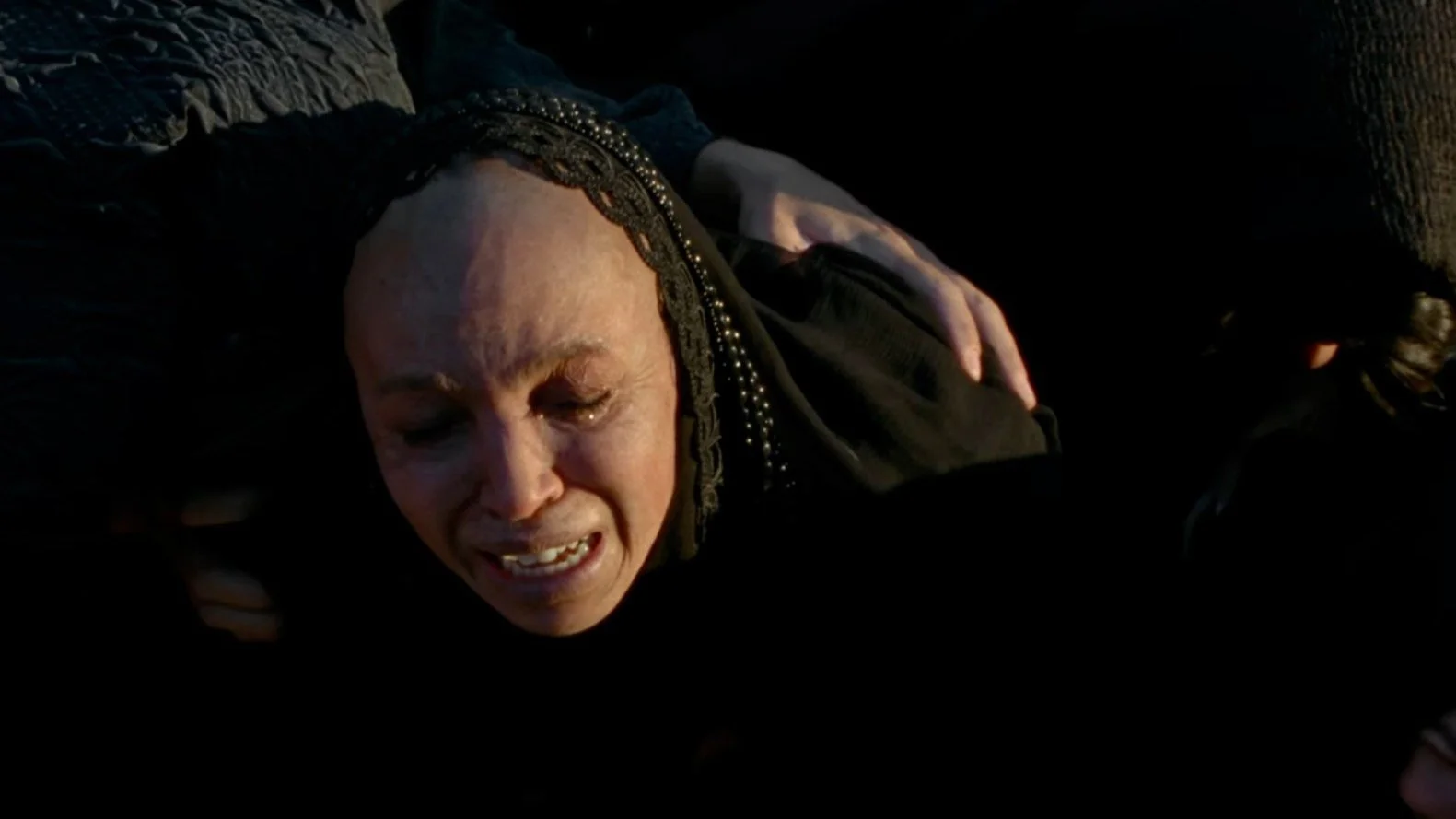The Carpenter's Son Review
"A biblical horror starring Nicolas Cage" is the kind of log line that sells a movie. Heading into Lotfy Nathan’s The Carpenter’s Son, this brief, but loaded, description of the movie had my mind racing with possibilities. How wild could this movie get? Are we getting “bad wig” Nicolas Cage, “strange accent” Nicolas Cage, or “absolutely bonkers” Nicolas Cage? How will this film articulate the “spiritual warfare” that the film promises in its tagline? Unfortunately, fans expecting something as big or meme-able as the reputation its marquee actor brings will be left wanting more and the film’s efforts to avoid this expectation might be its biggest flaw.
The film centers around a Jesus Christ as a young man, portrayed in this film by Noah Jupe, as he travels around in secret with his parents, Joseph and Mary, played by Nicolas Cage and FKA Twigs. In a society that has killed before in search of the rumored "messiah," the trio go from village to village, laying low as Joseph earns money from his carpentry work and fleeing to the next place when rumors arise of Jesus' divinity. Joseph wields a patriarchal control over Jesus, demanding he not spend unsupervised time with any other villagers and instead focus on studying the Torah at school. Jesus, unaware of the holy parentage that has made him a perceived threat to society, knows nothing about his purpose on Earth, but knows that he is different. He experiences strange visions, hears whispers from within his own mind, and has a power in healing and resurrection that he cannot explain.
After settling into a new village, Jesus meets a young person at synagogue school with a particular interest in him: Satan, played by Isla Johnston. Satan seeks to court Jesus away from his demanding father and encourage him to use his powers however he wants to, an act that might clear his mind and give him purpose, but will ultimately lead to his death if the villagers discover who he is. Throughout the film, Jesus wrestles between the influences of his emotionally and physically abusive father and the enticing words of freedom coming from Satan, leading to a climactic showdown featuring CGI snakes, visions of hell, and death at the hands of Christ himself.
The Carpenter's Son portrays all of this with intelligent budget-friendly production design, on-location shooting, and horror elements that are more gore-adjacent than supernaturally scary. The simple, rugged set design feels believable and lived-in, turning the Maltan countryside into a small Egyptian village with a handful of locations used cleverly. The demon version of Satan that appears when the facade of Isla Johnston must be dropped is not an expensive CGI demon, but an expressive contortionist with an unsettling physicality. The biggest this film gets in its visual presentation is the CGI snakes that infest people through their mouths and a portrayal of Hell that we don't get a long enough look at, leaving an unclear creepy image in our heads.
So if the film is not relying heavily on a heavy VFX presentation or clever soundstage filmmaking to showcase the promised spiritual warfare, one wouldn’t be faulted for assuming the actors in this supernatural horror might bring some showstopping performances to illustrate the battle between Heaven and Hell. Under this assumption, the film delivers some underwhelming results.
The marquee performer, Nicolas Cage, brings a reverence and a focused anger to the role of Joseph, but the role doesn’t feel as thoughtfully performed as something like his role in Pig, where he goes for a similar “serious performance.” FKA Twigs, known for her choreography and physicality in the visuals of her music career, gets less screen time compared to her on-screen husband and son, and only one moment towards the end that showcases her artful talent. Noah Jupe has a lot to tackle with the leading role of Jesus, and his approach ends up feeling too “immature emotional teenager” to articulate the interiority of Jesus’s conflicting man-or-messiah journey while not being big enough to sell his emotional outburst against his father and Satan. And while Isla Johnston brings a creepy intensity as Satan that serves the character well, most of her scenes are wasted as she plays against Jupe, who can’t match her energy.
What I have written above reads somewhat like I am disappointed that there aren’t any big, bombastic, Cage-sploitation level performances to write about—and to an extent that’s true. What is closer to reality is that The Carpenter’s Son doesn’t want to be the kind of film I was expecting it to be. The film carefully lays out its story and the actors seem to follow suit, in hopes that the sum of their parts will find something more spiritually affecting than “biblical horror starring Nicolas Cage” suggests, but the subtlety and reserve in the performances and visual language are a stumbling block, resulting in a film that plays it safe to the point of losing the elements that might viscerally engage the audience. The Carpenter’s Son looks reverently towards something unseeable to elevate the film to be something profound, but maybe it just needed Nicolas Cage to go crazy.
If you enjoyed this article, please consider becoming a patron of Hyperreal Film Journal for as low as $3 a month!


This is Dylan Samuel. If you see him, say “hello.”